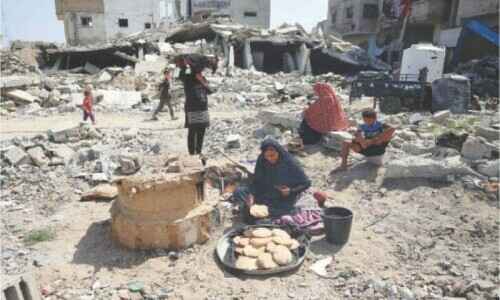GAZA STRIP: Sunday marked the fourth day of intense fighting and airstrikes in Gaza City’s Shujaiya quarter, months after Israel declared that Hamas had dissolved its command structure in the region to the north.
The army claimed to have battled Palestinian fighters “above and below ground” in tunnels, and tens of thousands of Palestinians have left the damaged neighborhood.
The Gaza truce and hostage release agreement have been the subject of months of intermittent negotiations, but little has been accomplished. Hamas claimed that a revised proposal put out by US mediators contained “nothing new.”
According to the Israeli military, throughout the previous 24 hours, ground and air troops “eliminated several terrorists” during operations on fighters’ compounds. Additionally, a week after Prime Minister Benjamin Netanyahu announced that the October 7–starting “intense phase” of the attack was coming to an end, it reported fighting in central Gaza and the southern Rafah area.
OCHA, the UN organization responsible for humanitarian relief, calculated that between 60,000 and 80,000 people had been displaced from Shujaiya as a result of the army’s evacuation orders and fresh combat that started on Thursday.
“Our lives have become hell” for those who are left, according to 50-year-old Shujaiya resident Siham al-Shawa. She stated that because strikes may occur “anywhere” and “it is difficult to get out of the neighborhood under fire,” people were stuck.
“We are unsure of where to go for self-defense.” Israeli “forces are operating in Rafah, Shujaiya, everywhere in the Gaza Strip,” according to Netanyahu.
Netanyahu reportedly informed his cabinet that “dozens of terrorists are being eliminated every day,” according to a statement from his office.
“Everything is in ruins.”
According to medical personnel at Nasser Hospital, where the bodies were brought, an airstrike that targeted a residence in Rafah before morning claimed the lives of six people. Parts of the city were also shook by artillery firing, according to witnesses.
Early in May, an Israeli military ground assault in Rafah resulted in the closure of a crucial humanitarian crossing.
The 2.4 million people living in Gaza are in grave danger of famine as a result of the Israeli siege, which has alarmed the UN and other relief organizations.
Speaking from Khan Yunis, Louise Wateridge of UNRWA, the UN organization that assists Palestinian refugees, declared, “Everything is rubble.” There is no food, water, or sanitary facilities available. And today, occupants are returning to these abandoned buildings.
Thousands of demonstrators once more descended into Tel Aviv’s streets on Saturday in Israel, demanding more work be done to free the remaining inmates and pushing for early elections.
“Eradicating warfare”
Washington last week offered “new language” for some of the planned arrangement, roughly a month after US President Joe Biden unveiled a plan for a cease-fire, according to US news site Axios.
Although the organization had received the most recent proposal, according to Osama Hamdan, a Hamas leader in Lebanon, it showed “no real progress in the negotiations.”
The plans, which Hamdan described as “a waste of time,” were designed to allow Israel “more time [.. ] to practice genocide.”
Israel has consistently rejected Hamas’ calls for a lasting truce and an Israeli departure from Gaza. “Hamas is the only obstacle to the release of our hostages,” stated Netanyahu on Sunday.
“We will return them all with military and diplomatic pressure,” he declared. In addition, the Gaza battle has increased tensions along Israel’s northern border with Lebanon, where the army has exchanged gunfire with the Hezbollah organization, an ally of Hamas backed by Iran. The likelihood of a full-fledged conflict has increased this month.
Iran’s UN mission stated on social media that it “considers Israeli propaganda about planning an attack on Lebanon as psychological warfare.”
Additionally, it issued a warning to its fiercest adversary, saying that “should it embark on full-scale military aggression, an obliterating war will ensue,” which might entice more armed organizations in the area that support Tehran.
Israeli strikes in the border area were reported by Lebanese government media on Sunday, while Hezbollah claimed responsibility for multiple attacks on Israeli military positions. Three deaths among its ranks were reported by the movement.








